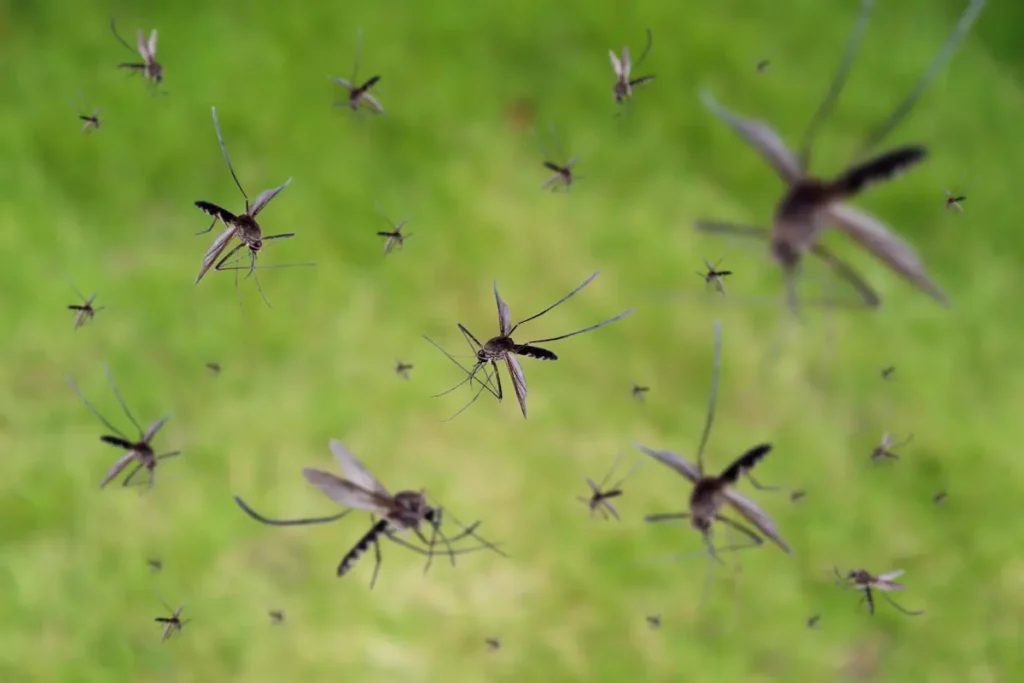Bleach is a useful agent to eliminate mosquito larvae. However, it has serious limitations.
The bleach can have a negative impact on the environment where the larvae are present.
Additionally, it has the potential to harm other living organisms in the vicinity.
There are natural yet effective ways to eliminate mosquito larvae with less environmental impact.
Summertime camping trips and late evening barbecues can be completely ruined by mosquitoes.
Constantly swatting at the air to keep them away and enduring days of itchy bites is no fun.
Wouldn’t it be great if you could eliminate these pests for good?
If you kill mosquitoes when they are young, you can effectively reduce their population.
This is because they won’t be able to mature and produce more mosquitoes.
A female mosquito has the ability to lay up to 300 eggs.
This means that there could be a large number of bloodsuckers waiting to grow up if they are left unchecked.
It is imperative to eliminate mosquito larvae as the best option for future peace from these pesky insects.
Discover if bleach is the best option and explore alternative ways to eradicate mosquito larvae.

Related Reading: Will Bleach Kill Millipedes? [ANSWERED]
Table of Contents
Using Bleach to Eliminate Mosquito Larvae
When using bleach to eliminate mosquito larvae, you should consider the location of the larvae.
Pouring bleach into a pond, pool of water, creek, or other waterways can harm other creatures living in the water.
When using bleach to eliminate mosquito larvae, it is important to ensure that they are separated from other water-based organisms like fish.
This means that you should only use bleach in situations where the larvae are isolated, such as in your gutter or small pools of stagnant water.
The goal is to kill the larvae without harming any other aquatic life.
With that precaution in mind, let’s take you through how to use the bleach.
There is no need to doubt the effectiveness of bleach in killing the larvae – it is guaranteed.
Take a gallon of water and add a tablespoon of bleach.
Pour the solution into the area where the larvae are.
The larvae have died.
It is that simple.
How Long to Eliminate Mosquito Larvae?
A study was conducted to test the effectiveness of bleach on mosquito larvae in tires.
Different doses of bleach were used to observe the results.
It was observed that adding 2 tablespoons of bleach to 5 liters of water was sufficient to eliminate the mosquito larvae.
However, after two weeks, pupae started to emerge.
To minimize the number of pupae, it was necessary to apply more bleach.
This implies that you may need to use bleach multiple times in the area where you found the mosquito larvae to get rid of them completely.
Natural Methods to Eliminate Mosquito Larvae
We mentioned that using bleach can have negative impacts on the local environment and other aquatic life.
To avoid destroying nature, alternative ways exist to kill off mosquito larvae.
Vegetable Oil
It’s important to note that this method should not be used in areas where fish are present.
If the oil from this method comes in contact with fish, it can cause dehydration, hypothermia, or starvation.
Additionally, there is a risk that the oil could cause the fish to sink.
If no fish are present, add a teaspoon of oil to the water.
Mosquito larvae will die.
Mosquito Dunks
These donut-shaped pellets contain mosquito-killing bacteria BTI, which only attacks mosquito larvae, making it safe for other aquatic organisms.
One dunk can remove larvae from a 1002 ft radius for a month.
Place it in water and say “Goodbye” to the larvae.
For your convenience, here is a link to a popular mosquito dunk.
Mosquito Dunks (Amazon Affiliate)
Moving Water
Mosquitoes breed in stagnant water with algae, which provides nutrients for larvae to grow.
You can eliminate mosquitoes by ensuring a constant flow of water through the area.
If you have a small pond, introduce a fountain or water pump.
If you live near a naturally stagnant water area, you should consider ways to introduce fresh water to the area.
However, it’s important to seek permission from your local authority before doing so.
You can’t just start diverting water without proper authorization.
Use Fish
You may already have fish in your pond, but they may not be interested in eating mosquito larvae.
Introduce goldfish, carp, and mosquitofish to your pond to eliminate mosquito larvae.
Koi fish, a type of carp from Japan, are a popular choice for some individuals.
However, it is essential to check with your local government or Environmental Protection Agency to see if they are permitted in your area as they may be a banned species.
Remove Mosquito Food
Mosquitoes can be attracted to your property if it’s not kept clean and tidy, as they feed on algae and bacteria.
Keep your pond or other water features clean by regularly removing any scum that forms on the water surface to eliminate food sources for unwanted guests.
Apple Cider Vinegar
You have two advantages with Apple Cider Vinegar: it acts as a mosquito repellent and will eliminate mosquito larvae.
To eliminate larvae, mix 15 parts vinegar with 85 parts water and pour the solution into the water containing the larvae.
The larvae will die in the next 24 hours.
Its effectiveness depends on the strength of the vinegar when not diluted too much.
For mosquito repellent, mix vinegar and water in a spray bottle and apply to exposed skin to keep mosquitoes away.
Dish Soap
Use a few drops of dish soap for every gallon of water where mosquito larvae are present.
This will effectively eliminate mosquito larvae.
You can substitute the dish soap with shampoo if you like.
What About Pesticide
We mentioned various natural ways of killing mosquito larvae.
However, you may be wondering about the use of pesticides.
Pesticides can control the issue, but their environmental impact should be considered.
This is because pesticides may contain methoprene, which, despite its low toxicity, can harm other organisms in the water.
Use Professionals
If you are overwhelmed by methods of ridding yourself of a mosquito infestation, or the problem is too big to handle, seek help from professionals.
Exterminators have the expertise and equipment to solve pest problems. Do a quick online search or look up local contacts in a phone directory.
Continue Reading: Does Bleach Kill Spiders? [ANSWERED]
Final Thoughts
When mosquitoes bite, they can transmit diseases like malaria and cause itching.
Preventing mosquito larvae is eco-friendly and effective.
Bleach may harm the environment and other organisms.
There are natural alternatives that work as effectively as bleach without causing damage.
Keep your property and water sources clean to prevent mosquitoes.
If you are not comfortable with do-it-yourself solutions, calling professional exterminators is a more straightforward option.
They can quickly and efficiently resolve the issue.
Enjoy living the outdoor life!!!
